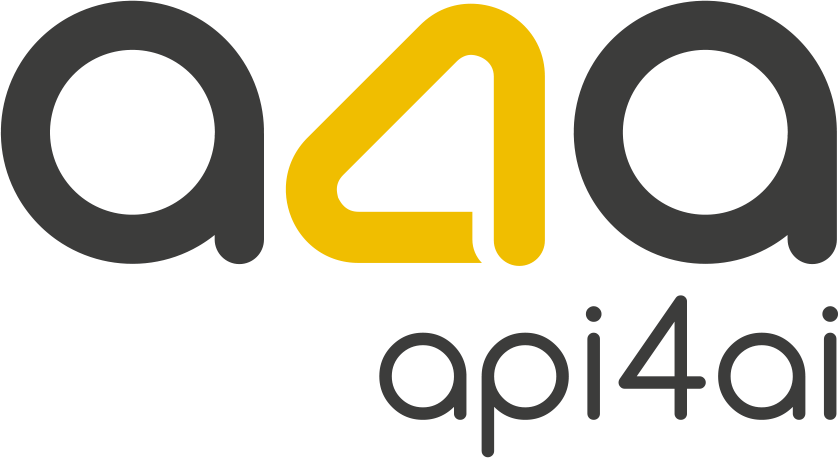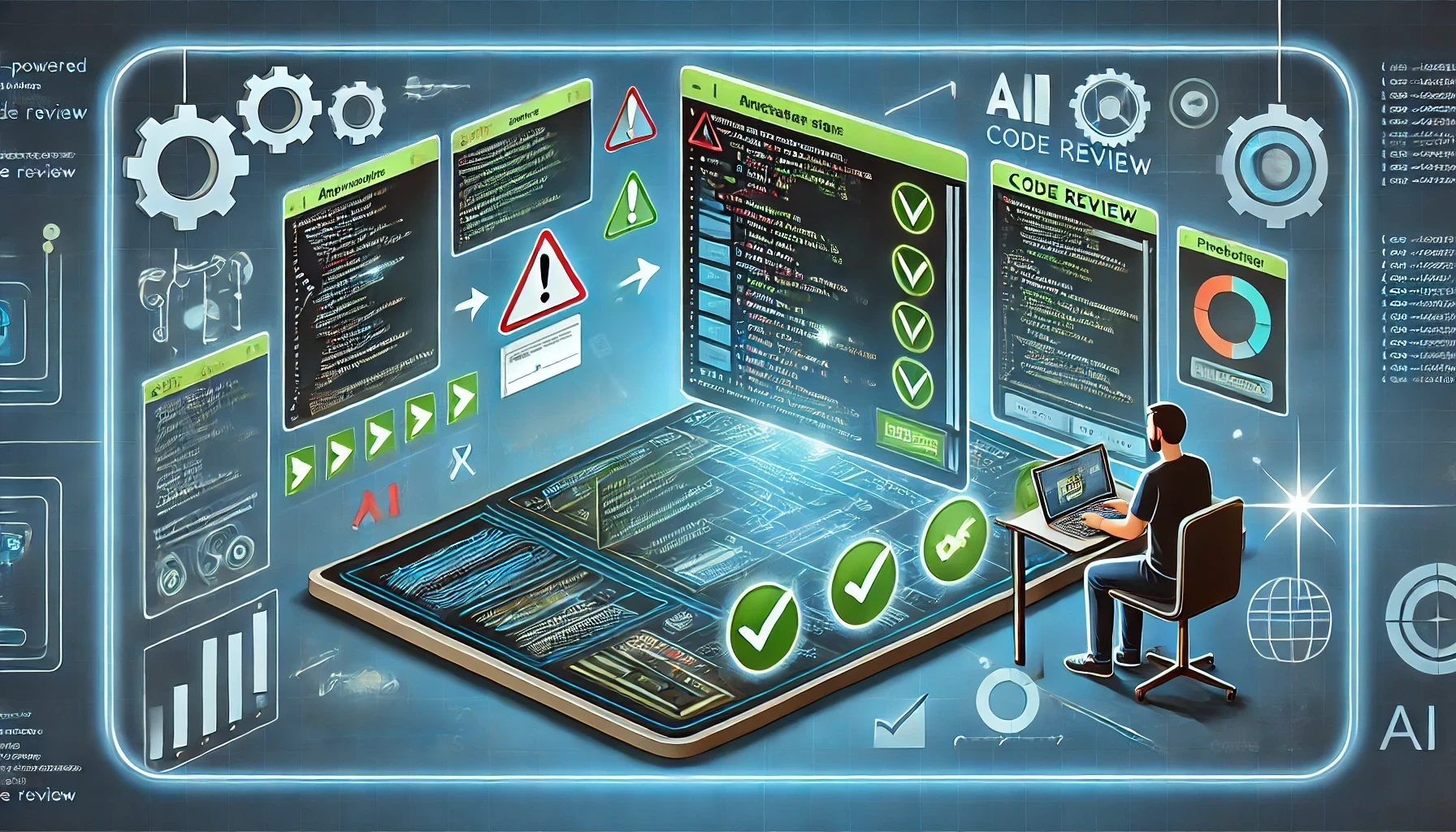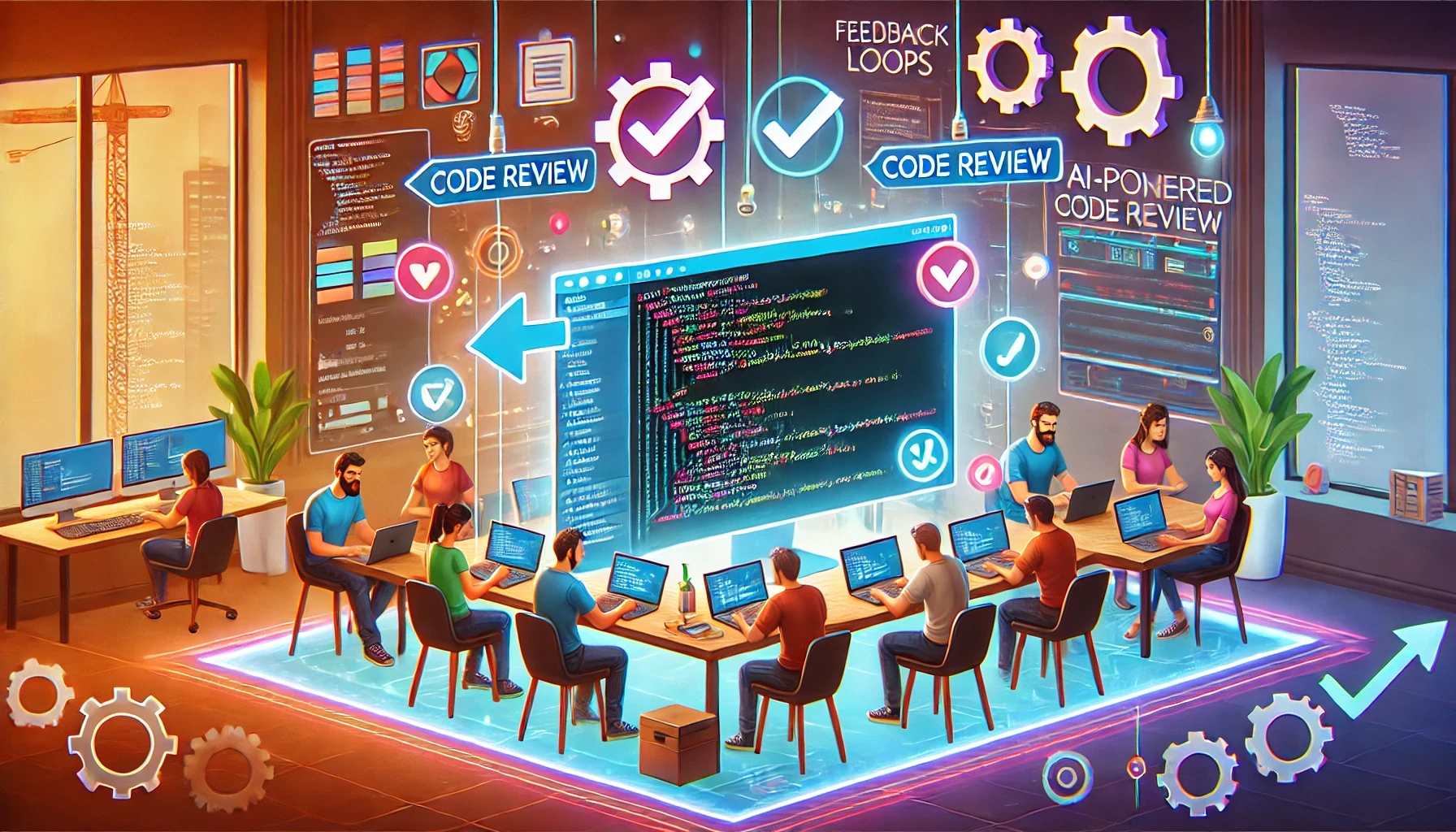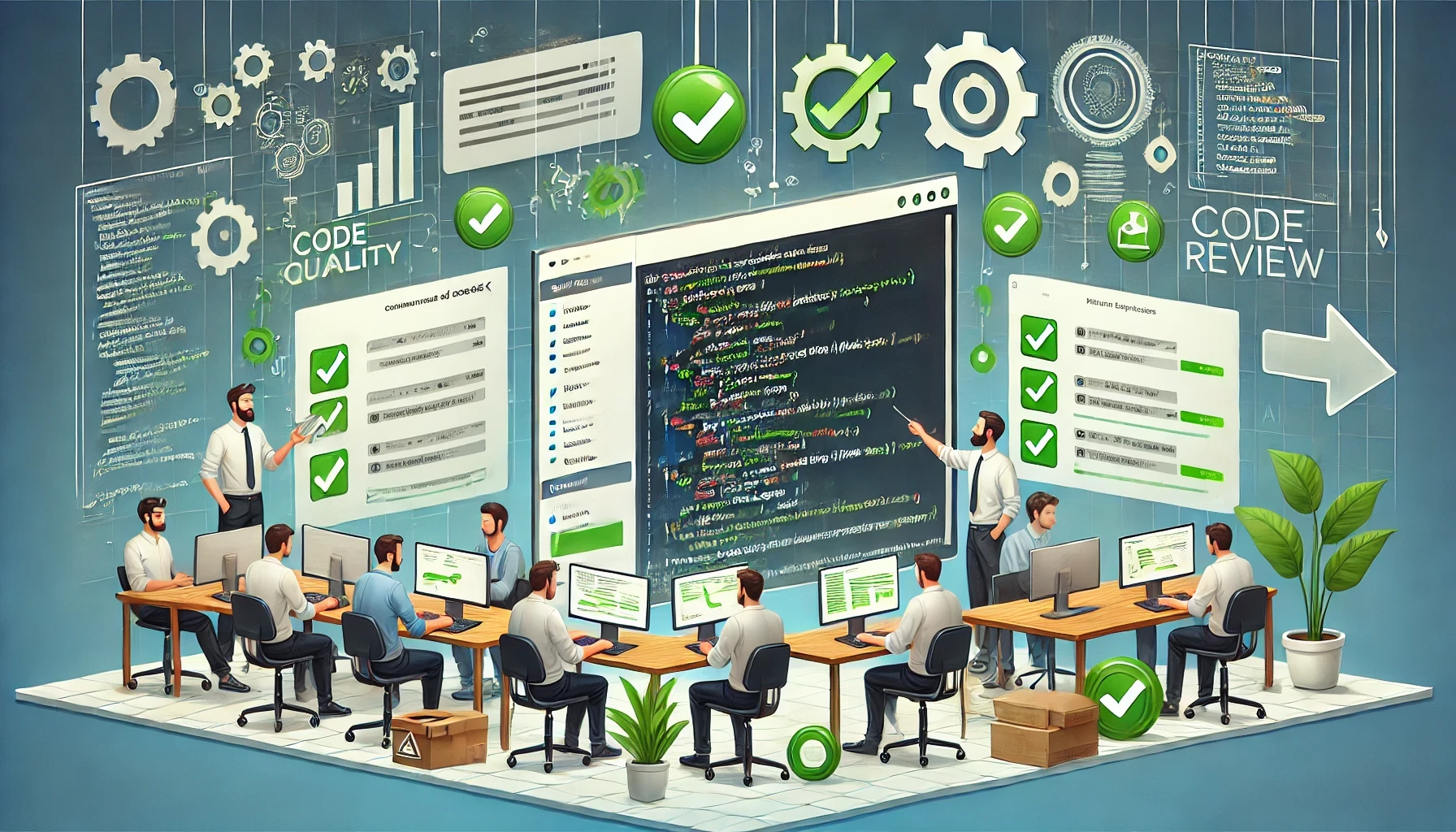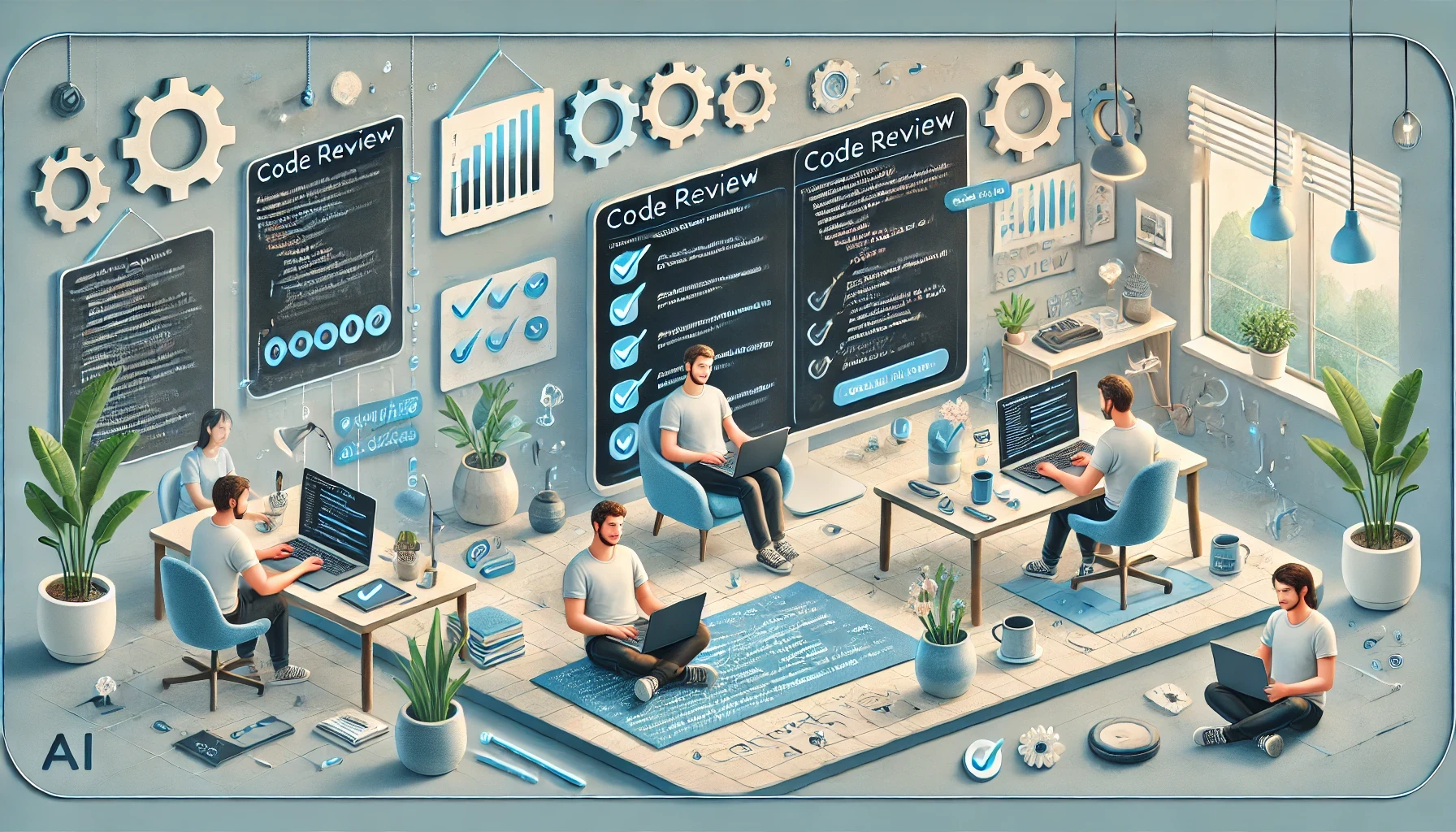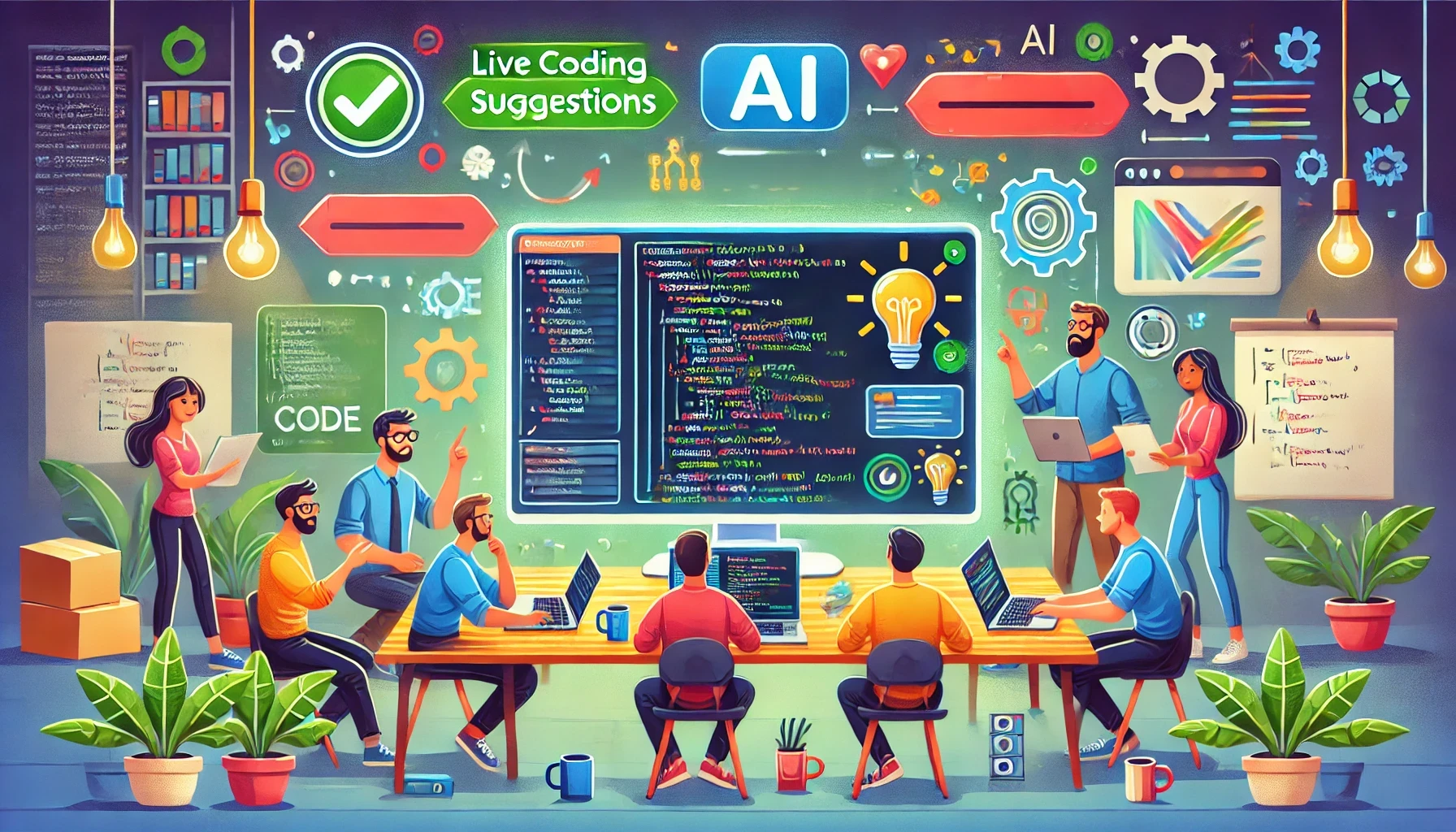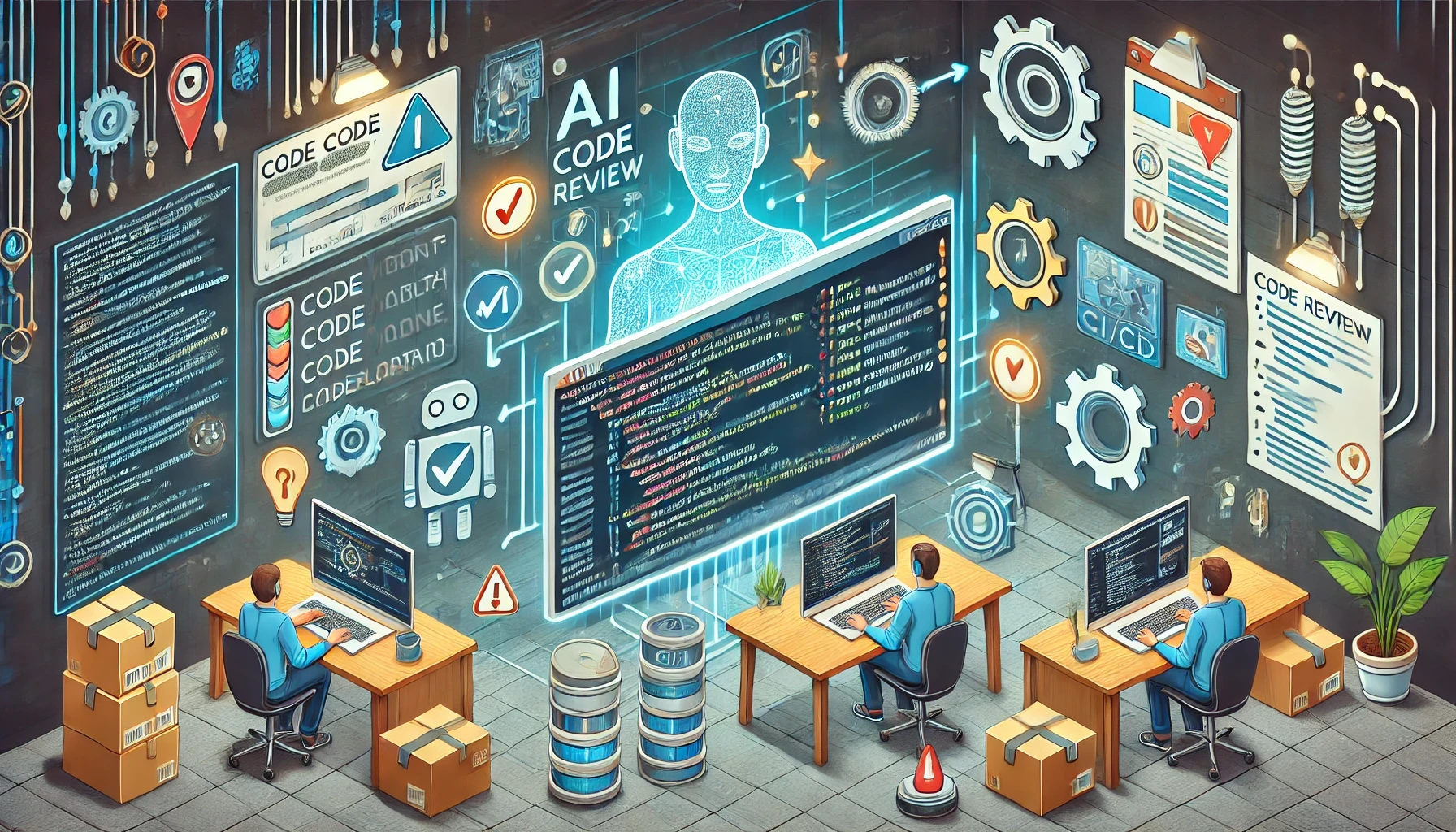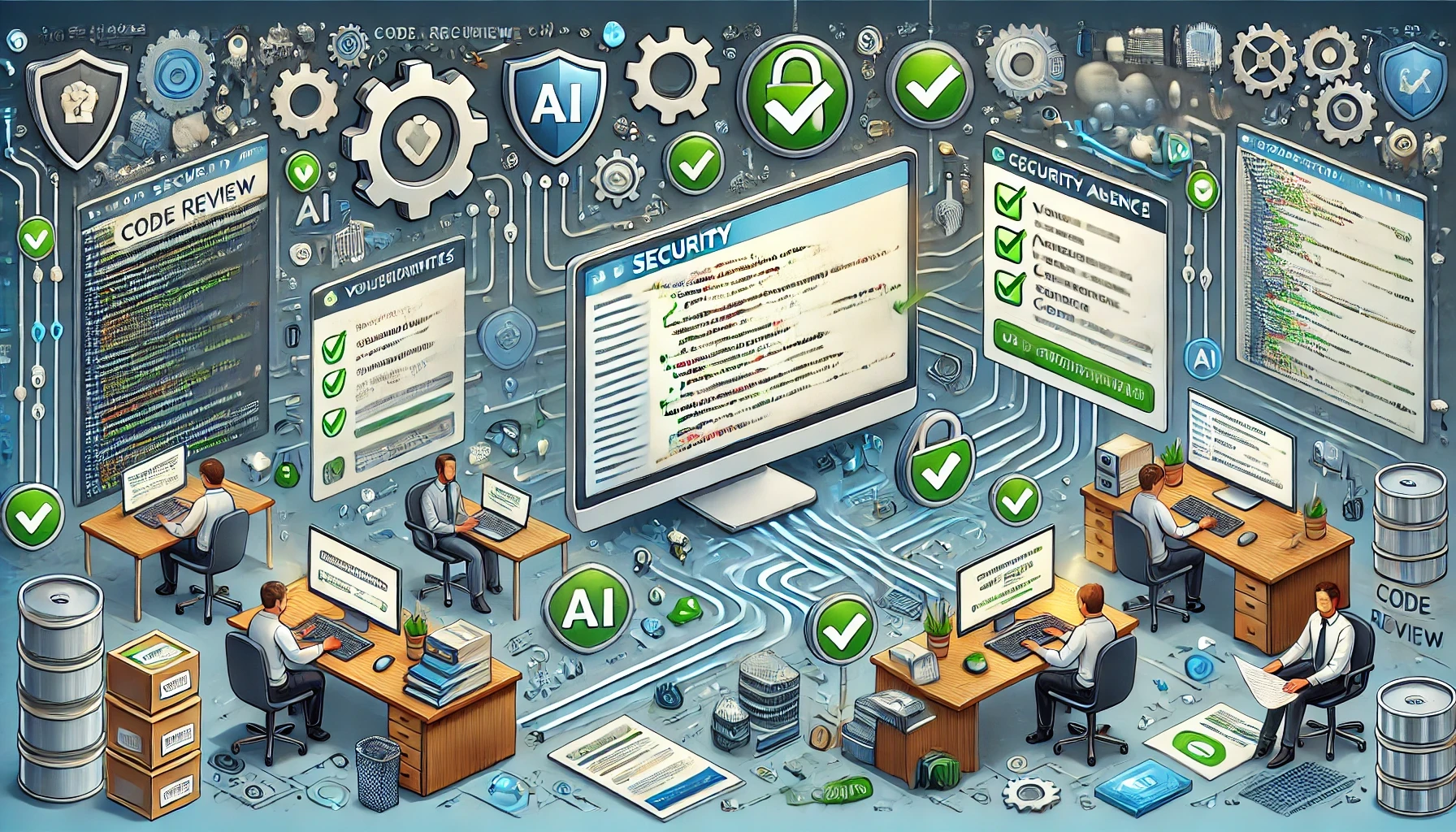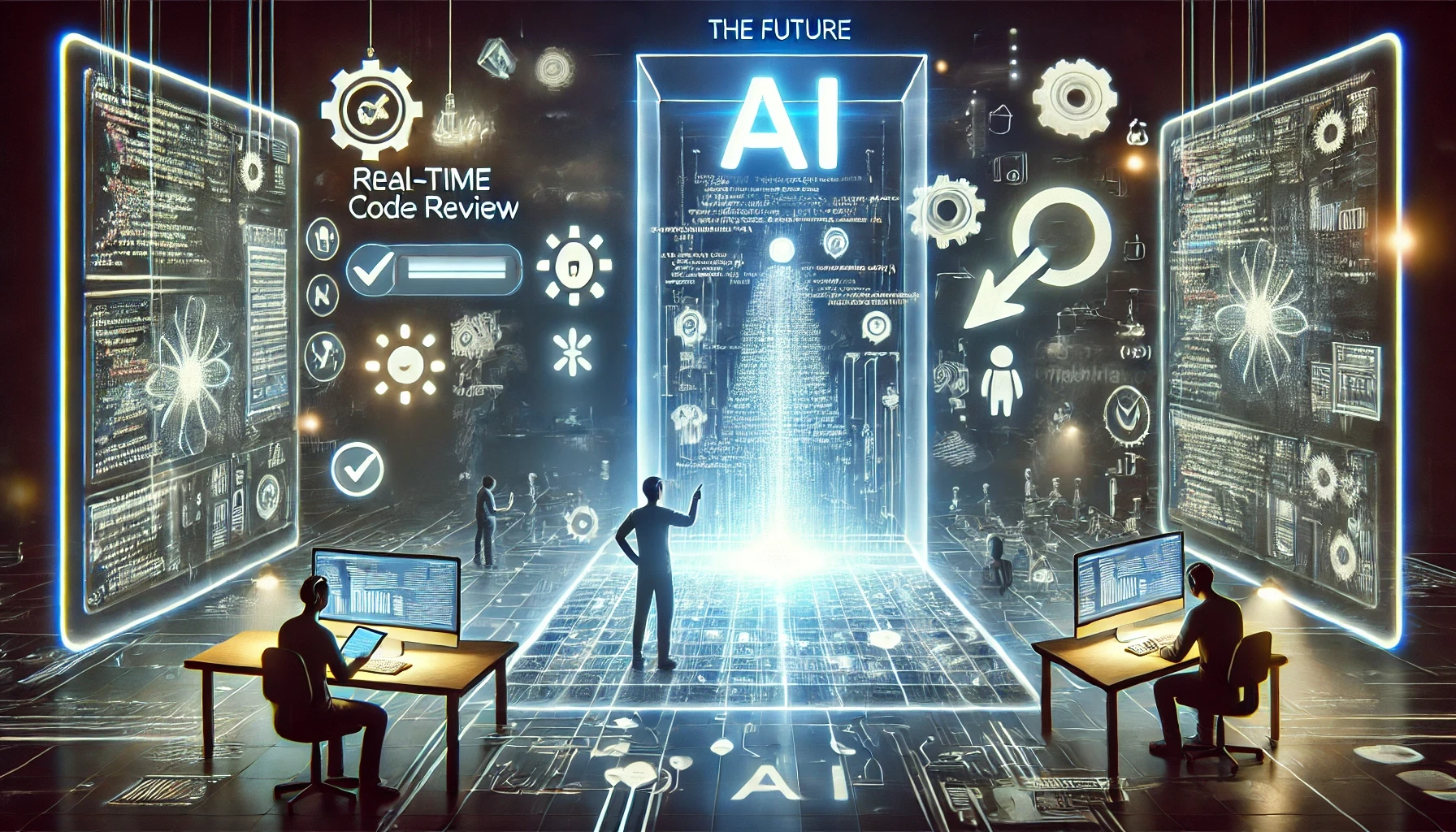Boosting Developer Efficiency with AI-Powered Code Review
Introduction
In today’s fast-paced software development environment, maintaining developer efficiency has become increasingly challenging. Teams often face tight deadlines, complex codebases and the need to juggle multiple projects. As a result, developers are required to not only write high-quality code but also ensure that their work aligns with team standards and best practices. The pressure to meet these demands often leads to long hours and frequent context-switching, impacting both productivity and morale.
One of the most time-consuming tasks in software development is code review — a critical step for maintaining code quality but also a frequent bottleneck. Traditional, manual code review processes require experienced developers to sift through every line of code for errors, performance issues and security vulnerabilities. This can result in delays, particularly when multiple merge requests need attention simultaneously. As team members spend more time on reviews, they have less bandwidth for innovation, development and collaboration.
Manual reviews also introduce the risk of human error. Even seasoned developers may overlook subtle bugs, inconsistencies, or potential security risks, especially when reviewing large or complex codebases under tight schedules. Additionally, manual code reviews can create bottlenecks that slow down deployment cycles, making it harder for teams to meet deadlines and deliver new features efficiently.
This is where AI-powered code review tools offer a transformative solution. By automating many of the tedious aspects of code review, AI systems help developers focus on higher-value tasks. These tools leverage large language models (LLMs) to provide rapid, precise feedback, ensuring that coding standards and best practices are met without requiring exhaustive manual effort. The integration of AI into code review workflows also accelerates development cycles, reducing the time between code submission and release.
As teams embrace AI-powered code review, they can eliminate bottlenecks, maintain higher levels of productivity and foster more efficient collaboration. With fewer distractions from repetitive review tasks, developers are empowered to dedicate their time to what matters most — creating innovative software. In this post, we’ll explore how AI-driven code review enhances team productivity, promotes collaboration and ensures code quality, making it an essential tool for modern software development teams.
How AI-Powered Code Review Works
AI-powered code review transforms the way software teams manage code quality, using advanced algorithms to automate tedious tasks, detect issues and enhance productivity. At the heart of these tools are large language models (LLMs), which leverage natural language understanding and programming knowledge to analyze code in ways similar to human reviewers — but with greater speed and consistency.
Analyzing Code with Large Language Models (LLMs)
AI-powered tools, built on state-of-the-art LLMs, go beyond simple syntax checks. These models have been trained on vast datasets, encompassing millions of lines of open-source code, best practices and documentation. As a result, they can detect not only syntactical errors but also logical flaws, security vulnerabilities and performance bottlenecks.
LLMs analyze each code snippet in the context of the entire project. They provide suggestions for improvements, such as refactoring recommendations, error handling enhancements and optimization strategies. Moreover, these tools ensure coding standards and best practices are followed consistently across all team members, reducing technical debt and ensuring high-quality code.
Seamless Integration with Development Workflows
AI-powered code review tools are designed to fit smoothly into existing development workflows, supporting collaboration and process automation. For example, with GitLab integration, AI tools like CRken automatically trigger reviews whenever a Merge Request (MR) is opened or updated. This ensures that every change is checked thoroughly, without adding friction to the development process.
When an MR is submitted, a webhook activates the AI-powered review tool, which evaluates each modified file and provides targeted comments. These comments appear directly within the code review interface in GitLab, sitting alongside feedback from team members. This seamless integration promotes transparency, enabling developers to see AI recommendations and human input side by side. Developers can quickly respond to AI suggestions, make adjustments and proceed with their work — minimizing delays and disruptions.
Adaptive Learning: Tailoring Feedback to Team Standards
One of the standout features of AI-powered code review tools is their ability to learn and adapt over time. These systems analyze past reviews, team-specific guidelines and feedback patterns to customize recommendations. For example, if a team prefers a particular code style or has specific rules around error handling, the AI can adapt to these preferences, aligning future reviews with those standards.
AI-powered code review tools can also recognize recurring issues and suggest preventive strategies, helping teams continuously improve their code quality. As the tool processes more Merge Requests, it becomes more precise in identifying the nuances of the team’s codebase, enhancing efficiency with each review cycle. This adaptive capability ensures that AI becomes a valuable partner — not just a reviewer — helping developers write better code in less time.
Accelerating Development Cycles with Automation
Traditional code reviews often create bottlenecks, especially when multiple developers submit changes simultaneously. AI-powered tools alleviate these delays by automating much of the review process. By analyzing and commenting on code in minutes, these tools prevent bottlenecks, reduce downtime and accelerate development cycles. Teams can focus more on innovation and feature development rather than being held up by lengthy review processes.
This automation also minimizes task-switching — developers no longer need to pause their work to conduct reviews for others. With AI handling the bulk of code reviews, development teams can deliver features up to 30% faster, ensuring quicker releases and greater agility in responding to market demands.
In summary, AI-powered code review tools enhance productivity and streamline development workflows by delivering quick, precise feedback, integrating seamlessly with platforms like GitLab and adapting to team-specific coding standards. This automation ensures that development teams can maintain high-quality code without sacrificing efficiency, making AI code review an essential part of modern software development.
The Benefits of AI Code Review for Development Teams
AI-powered code review tools have become an essential part of modern development workflows, offering numerous benefits that enhance both individual and team productivity. These tools streamline the review process, ensure code quality and accelerate software delivery. Let’s explore the key advantages that make AI-powered code review a game-changer for development teams.
Speed: Faster Code Reviews for Quicker Deployments
Traditional code reviews can be time-consuming, especially when teams have to manually check for bugs, style violations and security vulnerabilities. AI tools dramatically reduce review time by automating many of these tasks. With real-time feedback available directly within platforms like GitLab, developers can address issues in minutes rather than hours or days.
By minimizing delays, AI-powered code review tools enable teams to move through their development cycles faster. Developers no longer have to wait for reviewers to finish multiple rounds of manual inspection, which means new features can be deployed more quickly. With AI handling the bulk of the review, teams can maintain their agility and stay ahead of deadlines.
Accuracy: Spotting Errors Humans Might Miss
Even the most experienced developers can overlook subtle errors, especially when reviewing complex or large codebases under tight deadlines. AI-powered code review tools bring unmatched precision to the review process by analyzing every line of code meticulously. These tools can detect hidden bugs, performance bottlenecks and potential security vulnerabilities that human reviewers might miss.
AI models are trained on vast amounts of code, enabling them to recognize patterns of errors and suggest optimizations that may not be obvious to a human reviewer. This accuracy not only improves code quality but also helps prevent costly bugs from slipping through the cracks and affecting production environments.
Scalability: Handling Multiple Pull Requests with Ease
Managing multiple pull requests (PRs) simultaneously can overwhelm development teams, especially during peak periods. AI-powered code review tools scale effortlessly, analyzing numerous PRs across large codebases without delay. Unlike human reviewers, AI tools don’t experience fatigue or reduced attention when dealing with repetitive tasks.
With automated, parallel reviews, teams can maintain productivity even when handling complex projects or meeting tight release schedules. This scalability ensures that all code changes receive the same level of scrutiny, regardless of the size or volume of the codebase.
Consistency: Uniform Application of Coding Standards
Inconsistencies in code reviews can create confusion and lead to technical debt over time. Different reviewers may apply coding standards unevenly, resulting in a fragmented codebase that is harder to maintain. AI-powered code review tools ensure consistent enforcement of coding guidelines across all projects, eliminating discrepancies between individual reviewers.
AI tools can be configured to align with team-specific standards and best practices, ensuring that every pull request meets the same high bar. This consistency reduces the likelihood of errors caused by mismatched expectations and makes code easier to maintain in the long run. It also helps new developers quickly adapt to project standards, fostering smoother onboarding and collaboration.
In summary, AI-powered code review tools boost team efficiency by accelerating code reviews, improving accuracy, handling multiple pull requests seamlessly and ensuring consistency across projects. By removing bottlenecks and automating repetitive tasks, these tools enable developers to focus on what they do best — building innovative software. For development teams seeking to improve productivity and code quality, AI-powered code review is no longer a luxury — it’s a necessity.
How AI-Powered Code Review Enhances Code Quality
High-quality code is the foundation of reliable, maintainable software, but achieving consistent code quality across large and complex projects can be challenging. AI-powered code review tools elevate code quality by automating key tasks — from enforcing standards to identifying security flaws — ensuring that every piece of code meets rigorous benchmarks. Here’s how these tools make a difference:
Ensuring Compliance with Industry Standards and Security Best Practices
Compliance with coding standards and security guidelines is essential for building reliable software, especially in industries with strict regulatory requirements. AI-powered code review tools ensure that code aligns with industry standards by checking every change against predefined rules, such as secure coding practices, documentation standards and performance guidelines.
For instance, AI tools can detect when functions or variables deviate from naming conventions, when error handling is inadequate, or when libraries introduce potential vulnerabilities. This automated oversight ensures that teams follow both internal coding guidelines and external security frameworks, such as OWASP or GDPR requirements, without the need for constant manual intervention. The result is consistent, compliant code that’s ready for production and resistant to security threats.
Detecting Performance Bottlenecks and Security Vulnerabilities
Even the most experienced developers can miss subtle performance issues or hidden vulnerabilities, especially under tight deadlines. AI-powered tools are trained to identify these issues early by analyzing the logic and structure of the code. They can pinpoint inefficient algorithms, memory leaks, or unoptimized database queries — problems that may not be obvious during manual reviews.
AI models also scan for security vulnerabilities such as SQL injections, cross-site scripting (XSS) and insecure API calls. By proactively detecting these flaws before the code is merged, teams can prevent critical security incidents and minimize the risk of costly post-release patches. With real-time feedback, developers can correct these issues immediately, ensuring that only secure and optimized code makes it to production.
Encouraging Better Coding Practices for Long-Term Maintainability
In addition to spotting immediate issues, AI-powered code review tools promote long-term code maintainability by offering recommendations that encourage better coding practices. For example, they can suggest refactoring overly complex code, replacing deprecated libraries, or improving code modularity. These recommendations are invaluable for teams aiming to build scalable, maintainable software.
Over time, consistent AI-driven feedback reinforces best practices and helps developers improve their skills. As the AI learns from team preferences and historical feedback, it tailors its recommendations to align with the team’s evolving standards. This ensures that the entire team writes better code, reducing technical debt and making future development smoother and more efficient.
AI-powered code review tools go beyond simple syntax checks. They ensure compliance with industry standards, identify performance bottlenecks and vulnerabilities and encourage best practices for long-term code health. By embedding these capabilities into every stage of the development process, AI-powered tools enable teams to deliver high-quality, secure and maintainable software — faster and with fewer errors.
Reducing Developer Burnout with AI-Powered Code Review
Burnout is a growing concern among software developers, driven by demanding schedules, repetitive tasks and the pressure to deliver high-quality code under tight deadlines. AI-powered code review tools play a pivotal role in alleviating developer burnout, enabling teams to work more efficiently while reducing stress. By automating repetitive reviews and minimizing task-switching, these tools allow developers to focus on more creative and meaningful aspects of their work.
Eliminating the Burden of Repetitive Code Reviews
Manual code review, though essential, can become a tedious and time-consuming task. Developers often have to sift through lines of code looking for minor errors, style inconsistencies, or potential vulnerabilities — tasks that, over time, can feel monotonous and draining. AI-powered code review tools handle these repetitive tasks efficiently, ensuring that all code changes are reviewed promptly and thoroughly.
With AI reviewing routine issues, developers can dedicate their time to more engaging activities, such as solving complex problems, designing new features, or refining product architecture. This shift in focus helps teams maintain their motivation and creativity, preventing the kind of mental fatigue that contributes to burnout.
Reducing Cognitive Overload for Developers
Juggling multiple responsibilities — such as writing new code, reviewing colleagues' code and managing pull requests — can lead to cognitive overload, where developers struggle to maintain focus and productivity. Frequent interruptions to review code also contribute to context-switching, which slows down progress and adds to stress.
By automating large parts of the code review process, AI tools reduce cognitive load and give developers the space to concentrate on higher-value tasks. With fewer disruptions, developers can stay in their creative flow, which improves both the quality of their work and their overall job satisfaction. AI-powered tools also help streamline communication by providing clear, structured feedback directly within the review interface, eliminating confusion and minimizing back-and-forth discussions.
Promoting a Healthier Work-Life Balance
In many development environments, the pressure to review and merge pull requests quickly often spills into after-hours work, disrupting personal time and contributing to burnout. AI-powered code review tools minimize the need for after-hours reviews by providing fast, automated feedback on pull requests as soon as they are submitted. This ensures that teams can maintain progress without sacrificing personal time.
With AI managing the bulk of the review workload, developers no longer need to spend evenings or weekends catching up on code reviews. This shift toward automation fosters a healthier work-life balance, reducing the risk of burnout and helping developers recharge more effectively between projects. Teams that maintain a sustainable pace are better positioned to deliver high-quality software consistently over the long term.
In summary, AI-powered code review tools significantly reduce the factors that contribute to developer burnout by automating repetitive tasks, reducing cognitive load and promoting a healthier work-life balance. With fewer distractions and less pressure, developers can focus on what they do best — building innovative software — and maintain their motivation and well-being throughout the development lifecycle.
Collaborative Development: AI as a Coding Partner
AI-powered code review tools are not designed to replace human reviewers but to complement and enhance team collaboration. By acting as an additional reviewer, AI helps streamline the development process and ensure that code reviews are thorough, accurate and consistent. When developers and AI work together, they create a more efficient and collaborative workflow that boosts productivity and fosters continuous learning.
AI as a Complement to Human Reviewers
AI-powered tools bring speed and precision to code reviews, but human insight remains invaluable. AI serves as a coding partner, taking care of repetitive tasks and flagging issues that require attention, while developers focus on more nuanced aspects — such as business logic, architecture decisions and usability concerns. This division of labor enables teams to balance automation with human creativity, ensuring that the code is both functional and aligned with project goals.
By automating routine checks and error detection, AI frees up developers to engage more deeply with the codebase. The result is a collaborative environment where AI and human reviewers work side-by-side, combining the strengths of both to deliver high-quality software.
AI as a Second Pair of Eyes
Even experienced developers can occasionally miss errors, especially under tight deadlines. AI-powered tools act as a second pair of eyes, providing objective and thorough feedback on every pull request. These tools excel at identifying overlooked issues — whether it’s an unoptimized function, a forgotten security check, or a potential bug.
AI tools like CRken provide targeted comments directly in GitLab, allowing developers to review feedback alongside suggestions from teammates. This dual-layer review process not only enhances code quality but also promotes trust and collaboration within the team, ensuring that all code changes are well-vetted before deployment.
Learning and Skill Development through AI Feedback
AI tools do more than just identify issues — they offer contextual suggestions for improvement, helping developers understand best practices and learn new coding techniques. For example, AI might recommend more efficient algorithms or highlight better ways to handle exceptions. Over time, these recommendations enable developers to hone their skills and deepen their understanding of languages and frameworks.
AI-powered reviews also reinforce coding standards, guiding new team members in adopting team-specific practices more quickly. As developers respond to AI feedback, they build habits that improve their coding abilities and contribute to a cleaner, more maintainable codebase. In this way, AI fosters continuous learning while enhancing collaboration within the team.
In summary, AI-powered code review tools create a collaborative ecosystem where AI and developers complement each other. AI acts as a helpful assistant, streamlining routine tasks and acting as a second set of eyes, while human reviewers provide creativity, insight and strategic thinking. This partnership not only enhances team productivity but also encourages skill development and continuous improvement, making AI-powered code review an essential component of modern software development.
AI Code Review and Continuous Integration/Continuous Deployment (CI/CD)
In fast-paced software development environments, Continuous Integration and Continuous Deployment (CI/CD) pipelines are essential for maintaining smooth workflows, ensuring code quality and delivering new features efficiently. AI-powered code review tools integrate seamlessly into these pipelines, automating key tasks to enhance code quality and speed up deployments. By catching issues early and providing actionable feedback, these tools ensure that only well-vetted code moves forward, reducing risks and improving team productivity.
Seamless Integration with CI/CD Pipelines
AI-powered code review tools are designed to fit directly into existing CI/CD workflows, ensuring that code reviews become an automated step in the process. With tools like CRken, a GitLab webhook triggers automatic reviews whenever a Merge Request (MR) is opened or updated. This automated process provides detailed feedback in minutes, eliminating delays and ensuring that code is reviewed and improved before merging into the main branch.
This seamless integration helps teams maintain development velocity without compromising code quality. Developers receive real-time feedback directly in the review interface, alongside comments from human reviewers, making it easy to implement improvements and keep the CI/CD pipeline flowing smoothly.
Ensuring High-Quality Code and Reducing Rollback Risks
One of the biggest challenges in CI/CD workflows is ensuring that only tested, high-quality code progresses through the pipeline. AI-powered code review tools play a critical role in achieving this by identifying potential bugs, performance bottlenecks and security vulnerabilities early in the process. With automated reviews in place, issues can be resolved before the code reaches staging or production environments, reducing the risk of rollbacks or post-release patches.
By ensuring compliance with coding standards, security practices and performance guidelines, AI tools provide an extra layer of validation. This mitigates the risks associated with rushed deployments, giving teams greater confidence that the code they release is both reliable and secure.
Accelerating Release Cycles with Faster Deployments
In a CI/CD environment, the ability to deploy updates quickly and frequently is essential for staying competitive. AI-powered code review tools speed up the entire release cycle by automating key parts of the review process. With real-time feedback, developers can resolve issues immediately, preventing bottlenecks and keeping the pipeline moving at full speed.
The result is faster feature releases, shorter deployment cycles and greater team agility. By reducing the time spent on manual reviews and minimizing downtime between pull requests and deployments, AI-powered code review tools help teams release software up to 30% faster, as seen with CRken. This increased efficiency allows developers to focus more on innovation and less on administrative tasks, making the entire development process more productive.
AI-powered code review tools are a natural fit for modern CI/CD pipelines, ensuring that code quality is maintained without slowing down development. By automating reviews, catching issues early and accelerating feedback loops, these tools enable teams to deploy high-quality code faster and more reliably. As a result, organizations can deliver better products to market at a faster pace, with fewer risks and smoother operations.
AI Code Review: Security and Compliance Benefits
Security and compliance are critical pillars of modern software development. As projects grow more complex, ensuring code is both secure and compliant with industry standards becomes a challenging task. AI-powered code review tools provide a robust layer of protection by identifying vulnerabilities and ensuring that code aligns with internal policies and external regulations. In addition, these tools play a proactive role in preventing technical debt by flagging issues early, helping development teams maintain a secure, compliant and maintainable codebase.
Automatic Detection of Security Vulnerabilities
Manual code reviews often struggle to catch subtle vulnerabilities such as SQL injections, cross-site scripting (XSS), insecure API calls, or hard-coded secrets. AI-powered code review tools excel at identifying these issues early, scanning every line of code with the precision of a seasoned security expert.
These tools are trained on vast datasets of real-world code and vulnerabilities, enabling them to recognize patterns that signal potential threats. As soon as a Merge Request is submitted, the AI tool reviews the code for signs of insecure coding practices and provides actionable feedback. This proactive approach allows developers to address vulnerabilities before they can make their way into production, minimizing the risk of security breaches and costly patches.
Ensuring Compliance with Internal and External Standards
Organizations today must comply with numerous regulations, including GDPR, PCI-DSS, HIPAA and others, while also adhering to their own internal coding standards. AI-powered code review tools ensure that every piece of code meets these requirements by automatically checking for compliance throughout the development process.
AI tools can detect violations of privacy regulations — such as the improper handling of personal data — and alert developers before the code is merged. They also monitor adherence to company-specific guidelines, such as secure coding practices or naming conventions. By embedding compliance checks into the review pipeline, teams can avoid costly non-compliance issues and build software that meets both internal and regulatory requirements from the start.
Preventing Technical Debt with Early Issue Detection
One of the hidden risks in software development is technical debt — the accumulation of suboptimal code that becomes harder to maintain over time. AI-powered tools play a key role in preventing technical debt by flagging issues early in the development cycle. Whether it’s identifying inefficient algorithms, outdated libraries, or poorly structured code, these tools provide recommendations to optimize code quality before it’s too late.
By ensuring that code adheres to best practices and is optimized for maintainability, AI tools help development teams avoid future refactoring costs. Early detection of code smells and potential bottlenecks reduces the need for extensive rework, allowing teams to focus on new features rather than patching old problems. This proactive approach contributes to a healthier, more maintainable codebase that supports long-term scalability and innovation.
In summary, AI-powered code review tools enhance security, ensure compliance and prevent technical debt by automating critical checks throughout the development process. By catching vulnerabilities, enforcing regulatory compliance and promoting maintainable code practices, these tools empower teams to build high-quality, secure software faster and with greater confidence.
The Future of AI-Powered Code Review
AI-powered code review is evolving rapidly and its future promises even greater value for software development teams. As these tools become more sophisticated, new capabilities and trends will transform how developers write, review and maintain code. From AI-driven refactoring to predictive bug prevention, the next generation of AI tools will take collaboration and efficiency to new heights.
AI-Driven Refactoring and Automated Code Optimization
In the future, AI-powered tools will go beyond identifying issues — they will suggest complete refactoring solutions to improve code structure and efficiency. Instead of simply flagging a performance bottleneck, AI will recommend optimized code patterns, helping developers rewrite inefficient sections automatically.
This shift toward AI-guided refactoring will save developers significant time and effort, especially when dealing with large, legacy codebases. These tools may also offer real-time optimization suggestions directly in integrated development environments (IDEs), enabling teams to proactively address issues before code reaches the review stage.
Seamless Integration with Multiple IDEs and Development Platforms
While today’s AI tools are typically integrated into platforms like GitLab, future AI-powered code review systems will work across multiple environments. Developers will be able to access AI insights within popular IDEs such as Visual Studio Code, IntelliJ IDEA, or PyCharm, ensuring that feedback is available wherever they write code.
This level of cross-platform integration will create a more seamless workflow, enabling developers to interact with AI-powered tools at every stage of the development process. The ability to receive AI-generated recommendations in real time — whether in a pull request or directly in an IDE — will further streamline development cycles.
Predictive Analysis for Bug Prevention
AI-powered code review tools are expected to evolve into predictive systems capable of anticipating future issues based on past code patterns. Using historical data and trends, these systems will proactively suggest improvements to prevent bugs before they occur. For instance, if the AI detects that a certain coding pattern frequently leads to memory leaks, it can recommend an alternative approach during development.
This shift toward predictive bug prevention will help teams reduce the need for reactive fixes, improving both code stability and deployment reliability. As these predictive models learn from ongoing development cycles, they will become increasingly effective at safeguarding codebases from potential issues.
The Rise of Explainable AI for Code Review
As AI tools take on more responsibility in the review process, explainable AI (XAI) will become essential. Developers will need to understand not just what the AI recommends, but also why it made those recommendations. Future code review tools will incorporate transparent, easy-to-understand explanations, allowing developers to gain insights into the AI's decision-making process.
This transparency will foster greater trust in AI-powered recommendations, making collaboration between human and AI reviewers more effective. It will also help developers learn new techniques by understanding the reasoning behind the AI’s suggestions, leading to continuous skill development and improved coding practices.
Expanding Support for Complex Languages and Frameworks
As AI-powered tools evolve, they will extend their capabilities to more complex programming languages and frameworks. Future models will be better equipped to analyze domain-specific languages (DSLs), low-level programming languages and specialized frameworks used in fields like machine learning, data science and embedded systems.
This expansion will ensure that AI-powered code review tools remain relevant across diverse industries and development environments. Whether it’s reviewing complex TensorFlow scripts or embedded C code for IoT devices, AI models will continue to adapt, helping developers maintain high-quality standards regardless of the technology stack.
In summary, the future of AI-powered code review is filled with exciting possibilities, from AI-guided refactoring to predictive bug prevention and explainable AI. With seamless integration across IDEs and expanded language support, these tools will enable teams to deliver high-quality software faster and with greater confidence. As AI technology evolves, developers will find themselves increasingly empowered by tools that not only automate code review but also offer valuable insights, making software development more efficient, collaborative and future-proof.
Conclusion
AI-powered code review tools are revolutionizing the way development teams work, offering speed, accuracy and consistency that manual reviews alone cannot achieve. These tools act as a catalyst for developer efficiency, automating repetitive tasks, improving code quality and fostering a collaborative environment. With the ability to seamlessly integrate into CI/CD pipelines, AI tools ensure that teams can release features faster and more confidently, minimizing bottlenecks and reducing downtime.
Beyond automation, AI empowers developers by enabling better practices and providing valuable insights that help them grow their skills. With real-time recommendations and actionable feedback, developers can adopt best practices more effectively, resulting in more maintainable code and fewer technical issues down the line. The transparency and precision of AI tools enhance team collaboration, providing a complementary partnership between human reviewers and AI.
AI also plays a crucial role in reducing burnout by minimizing task-switching and freeing developers from the burden of routine code reviews. This allows them to focus on more creative and meaningful work, leading to higher engagement, better productivity and a healthier work-life balance. By reducing cognitive overload, AI tools help developers perform at their best, even during demanding projects.
Adopting AI-powered code review is not just about automation — it’s about empowering developers, promoting continuous improvement and transforming software development into a more efficient and sustainable practice. As AI-driven tools continue to evolve, they will become essential allies for teams striving to deliver high-quality software faster and with fewer errors. In a competitive development landscape, embracing AI in code review isn’t just an advantage — it’s becoming a necessity for teams that want to stay ahead and build better products.
With AI-powered tools like CRken, developers and organizations can harness the potential of advanced automation to enhance collaboration, optimize workflows and build more innovative solutions. As the technology progresses, AI-powered code review will remain a critical component in shaping the future of software development.
